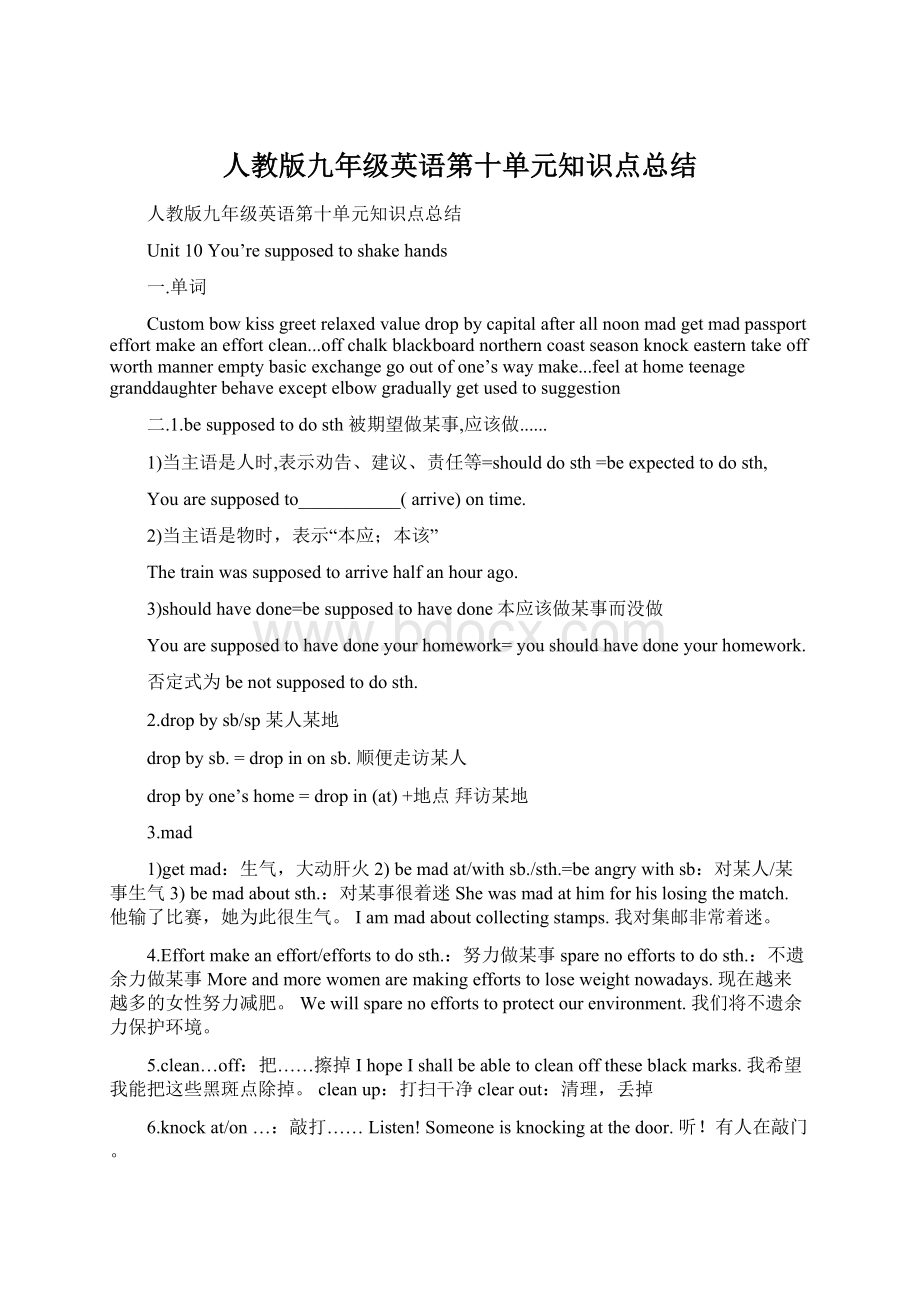人教版九年级英语第十单元知识点总结文档格式.docx
《人教版九年级英语第十单元知识点总结文档格式.docx》由会员分享,可在线阅读,更多相关《人教版九年级英语第十单元知识点总结文档格式.docx(6页珍藏版)》请在冰豆网上搜索。

Wewillsparenoeffortstoprotectourenvironment.我们将不遗余力保护环境。
5.clean…off:
把……擦掉IhopeIshallbeabletocleanofftheseblackmarks.我希望我能把这些黑斑点除掉。
cleanup:
打扫干净clearout:
清理,丢掉
6.knockat/on…:
敲打……Listen!
Someoneisknockingatthedoor.听!
有人在敲门。
bowtosb向某人鞠躬
7.worthbeworthsth.:
值……钱,值得……be(well)worthdoing:
值得做某事
TheForbiddenCityisworthavisit.=TheForbiddenCityisworthvisiting.故宫值得一游。
8.mannern.方式,方法(pl.)礼貌礼仪
Whyareyoutalkinginsuchastrangemanner?
你为什么用这种奇怪的方式说话?
It’sbadmannerstotalkwithafullmouth.嘴里吃着东西说话是不礼貌的。
9.gooutofone’swaytodosth=tryone’sbesttodosth=makeaneffort/effortstodosth=sparenoeffortstodosth.格外努力做某事Johnwentoutofhiswaytomakehisgirlfriendhappy.
10.expect
(1)expecttodosth预计做某事
(2)expectsb.todosth期待某人做某事=lookforwardtodoingsth期待做某事(3)Iexpectso/not
a.Iexpectthegroup________(sing)popsongs.
b.—Doyouthinkourfootballteamwillwinthematch?
—Yes,wehavebetterplayers.soI___themtowin.
A.hopeB.askC.helpD.expect
11.assoonas一„„就„„
⑴指未发生的动作,规律是:
主句一般将来时,从句用一般现在时代替一般将来时
如:
Iwilltellhimthenewsassoonashecomesback。
⑵指紧接着发生的两个短动作,主从句都用一般过去时
如HetookouthisEnglishbooksassoonashesatdown
I’llgotovisitmyauntinEngland___thesummerholidaysstart.
A.whileB.sinceC.untilD.assoonas
13.Weoftenjustwalkaroundthetowncenter,seeingasmanyofourfriendsaswecan.
walkaround意为“到处走走”、“闲逛”的意思,“没有目的的行走”
as...asonecan/could尽可能......,尽量......=as...aspossible
seeing为现在分词短语作伴随状语,说明谓语动作发生时,另一个动作也在发生。
Theteachercameintotheclassroom,holdingabookinhishand.
14.pointat,pointto,pointout
pointat习惯上表示指向离说话人较近的事物,意为“指着”,at是介词,着重于指的对象。
pointto用来表示指向离说话人较远的事物,意为“指向”,to也是介词,着重于指的方向。
pointout表示的是给某人指示方向,要点或错误等,意为“指出”,out是副词。
Hepointed_______thehouseontheothersideoftheriverandsaid,“That’smyhome.”
Don’tpoint________thewordswhileyouarereading.
Theteacherpointed_______manymistakesinmyhomework.
15.except“除……之外”(不包含在内)
besides“除……之外(还)”(指除去的部分包括在前面提到的范围之内。
)
Allofuswenttothepark_____Bob.Hehadtolookafterhissister.A.besidesB.withC.Except—IsJackgoodatbasketball?
—Yes.______basketballheisalsogoodattabletennis.
A.ExceptB.BesidesC.ButD.Beside
16.forthefirsttime/atfirst/firstofall/thefirsttime
atfirst起先;
最初(类似atthebeginning最初,刚开始)
Wedidn'
ttrusthimatfirstbut..最初我们不相信他但后来相信了
firstofall首先,关键点在于强调最重要的是,第一点是
Whenyouwanttoworkforourcountryinthefuture,____,weshouldhavestrongbodyandrichknowledge.A.atfirstB.firstofallC.forthefirsttimeD.afterall
forthefirsttime第一次
thefirsttime则是引导时间状语从句,when怎么引导时间状语从句的,thefirsttime就能放在什么位置.只要记住把thefirsttime看成是when,虽然意思不同,但用法相同,比如
IthoughtherhonestthefirsttimeImether.
17.holdout伸出;
坚持
holdoutone’shandsholdoutmyhand伸出我的手
Sheheldoutherhandtotaketherope.她伸手去抓那根绳子。
holdon抓住;
(打电话时用语)别挂断...
holdup举起;
.holdback阻碍;
holdoff不使挨近;
挡住;
耽搁;
离开
holddown压制;
压缩holdonto坚持;
不放弃holdin压住;
忍耐;
抑制
LiLeiwantedtotellhereverything,butsomethingmadehim______.
A.holdupB.holdbackC.holdonD.holdout
IwanttoknowifanEnglishSingingCompetition____nextmonth.
A.willholdB.willbeheldC.holdsD.isheld
18.Wedon’tliketorusharound,sowedon’tmindifpeoplearealittlelatesometimes.
rushout冲出去rushhour交通拥挤时间rusharound匆匆忙忙;
东奔西跑
runaway=flee逃跑runoutof=useup用完
runoff跑掉(其后不直接跟宾语,常与to/from连用)
Allthestudentsranofffromtheirclassroomtotheplaygroundwhentheearthquakehappened.19.Ifyoutellafriendyou’regoingtotheirhousefordinner,it’sOKifyouarriveabitlate.
abit稍微;
有点,修饰形容词、副词及它们的的比较级。
Tryyourbest,Linda,It’sonly________difficultforyou,youcandoitwell
AabitofBabitCalotofDalot
abit和alittle作程度副词修饰形容词、副词、动词或比较级时,意义相同,为“一点儿,有些”。
Hewalkedabit/alittleslowly.
alittle可直接修饰名词;
而abit后须加of才可以。
Thereisalittlewaterinthebottle.=Thereisabitofwaterinthebottle.
否定形式:
notalittle相当于very/quite,notabit相当于notatall,意为“一点也不”
Heisnotalittle(=very)hungry.他饿极了。
Heisnotabit(=notatall)hungry.他一点也不饿。
20.Whenyougoabroad,itisimportanttobringyourpassport.
abroad用法:
表示到(在)国外,是一个副词,前面不加介词。
goabroad出国liveabroad住在国外athomeandabroad在国内外
21.WhereI’mfrom,we’reprettyrelaxedabouttime.在我们国家,我们对时间相当宽松。
WhereI’mfrom是一个由where引导的地点状语从句。
又如:
Wherethereisawill,thereisaway.
relaxingadj.使人放松的,令人感到轻松的。
主为物relaxedadj.“宽松的,不加以约束的”,主为人。
后面常接介词about。
berelaxedabout对...感到放松,对......比较随意
Myparentsarerelaxedaboutmyclothes.我的父母对我的服装不加约束。
22.Wevaluethetimewespendwithourfamilyandfriendsinoureverydaylives.
spendsometimewithsb
valuev“重视;
珍视n“价值”→valuableadj.贵重的;
宝贵的
Whichdoyouvalue,wealthorhealth?
你珍视哪一种,财富还是健康?
Thankyouforyour______________(value)helpandpracticaladvice.
(1)everyday每天=eachday做状语,放在句末,对其提问用howoftenHeexerciseseveryday.
(2)everydayadj.每天的,作定语,修饰名词,放在名词之前everydayEnglish日常英语Cookingbreakfastishereverydayjob.做早饭是她的日常工作。
everyday/everyday的区别:
前者是形容词,而后者是副词性短语。
DoyouspeakeverydayEnglisheveryday?
你天天讲日常英语吗?
23.Ialwaysleavesthehouseearlytoavoidheavytraffic.
avoiddoingPractice/enjoy/keep/mind/suggestdoingHeavytraffic交通拥堵;
车水马龙
Rushhouristhetimeofdaywhentisveryheavy.
24.Weusuallyplantodosomethinginteresting,orgosomewheretogether.
plantodosth=makeaplan/planstodosth=planondoingsth.
gosomewhere去某地somewhere是不定副词,前不能用介词。
25.be/feelcomfortabledoingsth做某事很舒服
I
am/feel
comfortable
talking
with
you.
和你讲话感觉很舒服。
26.Befullof=befilledwith充满...Thebasketisfullofapples.=thebasketisfilledwithapples.
27.Youhavetocutitupandeatitwithafork.cut
up
切碎;
切开
有关的短语
cut
down
砍倒
one’s
hair
理发
切
碎
in
插嘴
off
切断,停止
28.make
sb.
feel
at
home
使某人感到宾至如归
make
mistake
犯错误
a
decision
做决定
bed
整
理床铺
noise
制造噪音
faces
做鬼脸
friends
交朋友
二.1.(和„)握手2.首次,第一次3.欢迎会4.犯错误;
交朋友5.一„就„6.伸出某人的手7.令某人惊讶的是8.在某人的两个脸颊上9.发现,查明10.对„放松/随意11.匆忙12.晚一点13.在我们的日常生活中14.顺便拜访15.尽可能多的„16.守时17.钟表之都18.毕竟,终归19.在中午20.生某人的气21.对„是重要22.有/没有礼貌把„擦掉擦黑板23.敲(门,窗„)24.脱下,起飞脱掉手套25.餐桌礼仪26.把...插进„27.把„擦掉28.特地;
格外努力做某事(4)
29.使某人感到宾至如归30.一个十几岁的(外)孙女31.切碎32.没有理由做某事33.出席,露面,到场34.正如你所想象的35.值得做某事36.做某事很舒适37.让某人一直做某事
38.应该做某事
(3)
39.期望某人做事
40.用错误的方式问候某人41.珍惜时间42.把筷子插在食物上43.敲打空碗44.给某人一些建议
重点句式:
1.---在你的国家,当人们第初次见面应当怎么做?
---你应当握手。
2.在美国他们应当握手。
3.---我应当穿牛仔裤吗?
--不,你应当穿西服打领带。
4.让别人等候是不礼貌的。
5.准时很重要。
6.如果有人邀请你在中午见面,那么你就应当在中午到哪。
7.在印度,你应当用手吃饭。
8.在中国,你不应当把你的筷子插食物中。
9.在韩国,年纪最大的应当先开始吃饭。
10.在中国,用你的筷子敲打空碗是不礼貌的。
三.Writealettertoyourpenpaltogivehim/heradviceandsuggestionsonhowtobehaveproperlyinChina.
1)英语书信的写法:
称呼Dear…,左起顶格写。
正文换行,也要顶格写,是信的核心部分。
因此要求正文层次分明、简单易懂。
祝福的话语,正文下换行,顶格写,如:
Bestwishes!
Takecare!
HappyNewYear!
HappyBirthday!
等。
结束语在正文下面的一、二行处,第一个词开头要大写,句末用逗号。
结束语的写法Yours,Sincerelyyours、Yourssincerely或Sincerely;
在结尾语下面的署名必须亲自签名,也不加任何的标点符号。
2)有关文化礼仪的写作常用句型
You’re(not)supposedto….Youareexpectedto…It’spolite/impoliteto…
It’simportantto…Youshould….
3.DearTony,
YoumustbeexcitedaboutcomingtoChinasoon.LetmegiveyousomesuggestionsandadviceaboutChinesecustoms.Whenyouareeatingatthetable,it’simpolitetostickyourchopsticksintoyourfood.Youarenotsupposedtopointatanyonewithyourchopsticks.Inourhouse,you’resupposedtoshakehandswithmyfatherforthefirsttime.Youarenotsupposedtokisswhenyoumeetmymother.Youcansayhellotoherwithabigsmile.Whenyougooutwithpeople,youareexpectedtocallfirst,it’simportanttomakeplanstodosomethinginterestingorgosomewheretogether.
HaveasafetripandIlookforwardtomeetingyousoon.
LinJie